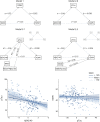Mediterranean Diet, Alzheimer Disease Biomarkers and Brain Atrophy in Old Age
- PMID: 33952652
- PMCID: PMC8253566
- DOI: 10.1212/WNL.0000000000012067
Mediterranean Diet, Alzheimer Disease Biomarkers and Brain Atrophy in Old Age
Abstract
Objective: To determine whether following a Mediterranean-like diet (MeDi) relates to cognitive functions and in vivo biomarkers for Alzheimer disease (AD), we analyzed cross-sectional data from the German DZNE-Longitudinal Cognitive Impairment and Dementia Study. METHOD: The sample (n=512, mean age: 69.5±5.9 years) included 169 cognitively normal participants and subjects at higher AD risk (53 with relatives with AD, 209 with subjective cognitive decline, and 81 with mild cognitive impairment). We defined MeDi adherence based on the Food Frequency Questionnaire. Brain volume outcomes were generated via voxel-based morphometry on T1-MRI and cognitive performance with an extensive neuropsychological battery. AD-related biomarkers (Aβ42/40 ratio, pTau181) in cerebrospinal fluid were assessed in n=226 individuals. We analyzed the associations between MeDi and the outcomes with linear regression models controlling for several covariates. Additionally, we applied hypothesis-driven mediation and moderation analysis.
Results: Higher MeDi adherence related to larger mediotemporal gray matter volume (p<0.05 FWE corrected), better memory (β±SE = 0.03 ± 0.02; p=0.038), and less amyloid (Aβ42/40 ratio, β±SE = 0.003 ± 0.001; p=0.008) and pTau181 pathology (β±SE = -1.96±0.68; p=0.004). Mediotemporal volume mediated the association between MeDi and memory (40% indirect mediation). Finally, MeDi favorably moderated the associations between Aβ42/40 ratio, pTau181 and mediotemporal atrophy. Results were consistent correcting for ApoE-ε4 status.
Conclusion: Our findings corroborate the view of MeDi as a protective factor against memory decline and mediotemporal atrophy. Importantly, they suggest that these associations might be explained by a decrease of amyloidosis and tau-pathology. Longitudinal and dietary intervention studies should further examine this conjecture and its treatment implications.
© 2021 American Academy of Neurology.
Figures


Comment in
-
Reader Response: Mediterranean Diet, Alzheimer Disease Biomarkers, and Brain Atrophy in Old Age.Neurology. 2022 Jan 11;98(2):88-89. doi: 10.1212/WNL.0000000000013072. Neurology. 2022. PMID: 35263268 No abstract available.
-
Author Response: Mediterranean Diet, Alzheimer Disease Biomarkers, and Brain Atrophy in Old Age.Neurology. 2022 Jan 11;98(2):89-90. doi: 10.1212/WNL.0000000000013074. Neurology. 2022. PMID: 35263270 No abstract available.
References
-
- Lourida I, Soni M, Thompson-Coon J, et al. Mediterranean diet, cognitive function, and dementia: a systematic review. Epidemiology. 2013;24(4):479-489. - PubMed
LinkOut - more resources
Full Text Sources
Other Literature Sources
Miscellaneous
